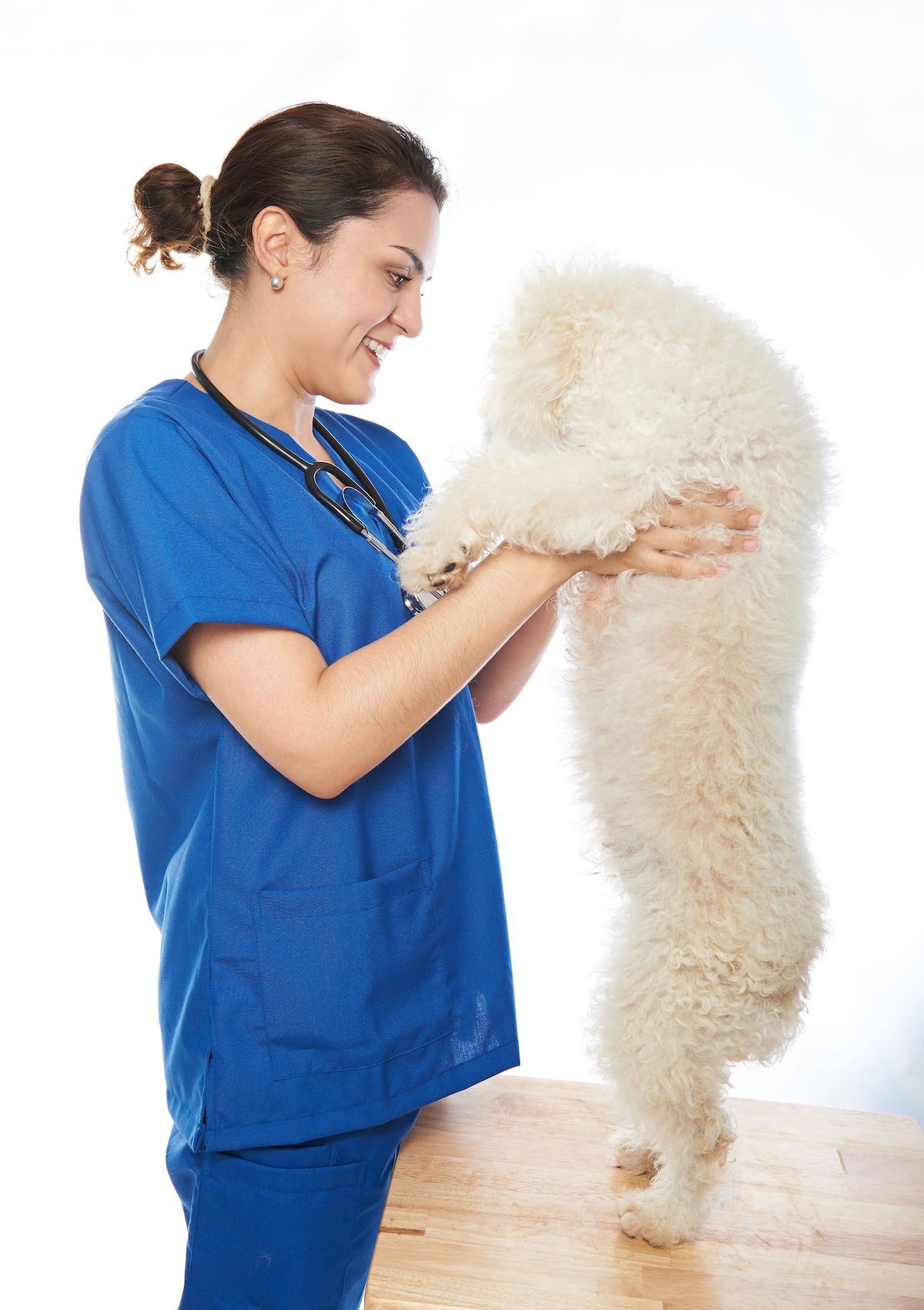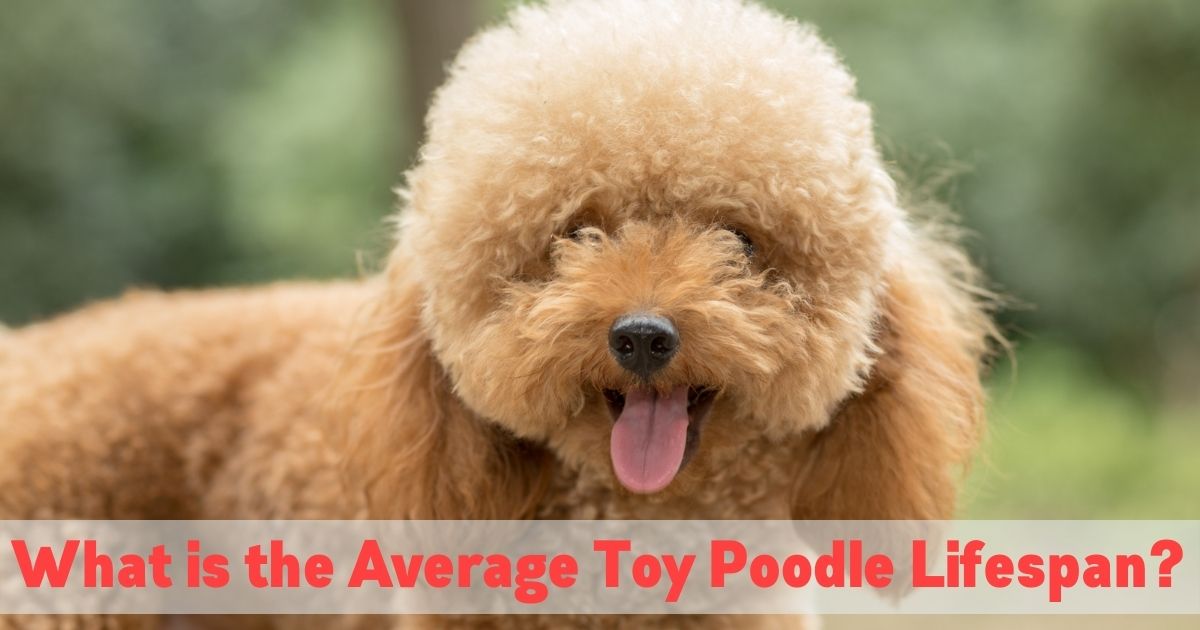So you want a poodle! A Toy Poodle, to be exact but, you’re unsure about a few things. Whenever anyone gets a dog, they have many questions. In this case, one of the many is what is the Toy Poodle lifespan?
Of course, there is not a one size fits all but we can speculate through research and common trends on how long they live. There are a few things that affect the lifespan of a dog. One, for example, is size, another is diet, and of course, systemic disease and lifestyle.
So want to know more about how long your toy poodle will be with you? Check it out below and read on!
The Toy Poodle as a Hypoallergenic Dog Breed
Many owners choose the Toy Poodle based on its hypoallergenic status. Wanting a dog and being allergic to it is pretty heartbreaking. Thank goodness for breeds like the Toy Poodle that allow those with allergies to enjoy the love and fun a dog brings.
Hypoallergenic dogs are classified as such because they do not shed fur or they shed very little. This allows the dander that is on their fur or hair to stay there. Other shedding dogs will release the dander with the hair that causes allergic reactions.
Poodles like the Toy Poodle have hair and not fur. This means that it does not shed or fall out, which requires them to need haircuts. The hair staying on the dog’s body helps avoid the allergy-causing dander from falling onto the floor, onto the furniture, or into the environment.

What is the Average Toy Poodle Lifespan?
When facing this question, there are a few things that need to be addressed and covered. First, if you think of a species such as humans, we do not always break down our average lifespan by our background but rather our health history and statistics.
For dogs, however, size is somewhat a factor in their lifespan. It is not a fact set in stone that the bigger the dog, the shorter the lifespan, or the latter for that matter. However, it has been studied that bigger dogs’ lives tend to be sped up.
That means that bigger dogs have accelerated lifespans, so disease or any ailments may hit them at an accelerated rate. This is different in comparison to the Toy Poodle. But, of course, no dog is truly protected against disease and are all likely to face some form of it in their natural lifetime.
But, for smaller dogs, like the Toy Poodle, it has been said that they tend to have a decently longer lifespan. For Toy poodles, their lifespan average is 15 years.
What are the Primary Causes of Death in Toy Poodles?
There are many causes of death to all dogs, including the Toy Poodle. But, when studying statistics, there are specific diseases and issues that have more prominence. Genetics is always a hard-standing factor. Do your best to research bloodlines before getting a Toy Poodle.
Some of the most common causes of death in toy poodles are:
- Neurological
- Cancer
- Trauma
- Heart disease
- Genetics
How to Ensure Your Toy Poodle Lives Long
As pet owners, we all want to extend our time with our beloved fur babies. So, of course, we want to do everything possible to make sure that happens. So here are a few ways to help keep your toy poodle healthy.
Of course, we aren’t claiming to be miracle workers, and no elixir grants immortality but some of these tips may help out. Poodles, in general, require a lot of physical exercise. This is due to their high energy needs.
Therefore keeping them physically active is extremely important. The more fit they are, the better shape they’ll be in and will avoid obesity and the diseases that come with it. While we’re on the subject, make sure to keep your Toy Poodle lean and fed the best possible diet.
Toy Poodles have very curly and thick hair coats. Keeping them well-groomed is a sure way to avoid any skin issues from matts. Matts can lead to skin infection, hot spots, and sometimes systemic disease.
You should make sure to keep up with your Toy Poodles health and wellness checks with your veterinarian. It’s essential to keep on top of their vaccines and bloodwork and always have them looked at if they feel ill.
Avoid feeding table food to your Toy Poodle as they are prone to gastrointestinal issues; this includes unhealthy treats. Of course, we all want to spoil our pets, but it’s best to avoid too much of anything that is not great for them in the long run.
The water your Toy Poodle drinks is also vital in extending their life. Make sure to research what water they drink and what is in it. Filtered water is the best type of water to give your pet to avoid any harmful bacteria or chemicals contaminating it.
Trauma is one of the leading causes of death in Toy Poodles. Trauma can be accidental or from a dog attack. Make sure to keep your Toy Poodle away from harmful situations and on a leash whenever they are out and about.
Dental health is just as crucial as systemic health to your Toy Poodles’ overall wellbeing. Unfortunately, dental health is often overlooked, but if left untreated, it can lead to heart disease and other issues like inappetence and pain for your dog.

Why Does Size Affect Life Expectancy?
Size affecting life expectancy is an interesting topic. Of course, many contributing factors affect why a dog may live longer than another. But as far as size goes, it used to be stated that the bigger the animal, the harder its body had to work.
But when taking a closer look, the bigger the dog breeds like the Standard Poodle compared to the Toy Poodle, the faster they age. This is because the body develops systemic disease faster or declines faster than its smaller counterparts by aging at an accelerated rate.
So diseases such as heart disease, liver disease, and cancer will happen a lot faster to a Standard Poodle than it would to the Toy Poodle. Also, the bigger the dog, the more likely they are to have joint issues.
Joint issues in themselves can cause a lot of problems down the line. Not to mention a bigger dog is a lot less likely to be held and carried everywhere. This can lead to their quality of life declining a lot faster than the Toy Poodle.
Of course, none of this will 100% happen, but it can explain why it sometimes happens. Many large dogs live just as long as small dogs, and some small dogs may decline before their larger counterparts.
Which Health Issues are Toy Poodles Prone to?
There are a lot of health issues that may come into your Toy Poodles life, but some are more common than others. Here we’ll take a look at some of the most likely issues that may face your Toy Poodle and what they mean.
Optical issues such as cataracts are a likely feature to happen to your Toy Poodle as they age. Cataracts are the clouding of the lens of the eyes. Cataracts can come on slowly or accelerate if due to other underlying diseases.
Bladder issues are another issue that plague Toy Poodles. Bladder issues include bladder stones, which are stones made up of minerals that are overwhelming in the bladder of your Toy Poodle. Bladder stones are very painful and can cause cystitis, leading to your dog being very uncomfortable.
Certain diets can treat bladder stones that increase fluid intake and dissolve any crystals in your Toy Poodles bladder. But, this only applies to certain crystals and not all. If crystals become abundant, they will form stones that have to be removed via cystotomy.
Cushing’s disease is another common disease that the Toy Poodle may face. Cushing’s disease, also known as hyperadrenocorticism, happens when the adrenal gland is overactive and leads to too much cortisol in your dog’s system.
This overproduction of cortisone will cause your dog to eat more, drink more, pant a lot, and gain weight. Some other clinical signs that owners may report are fat pot belly appearance, extreme panting, excessive thirst, and hunger.
Skin disease is another ailment that Toy Poodles may face. Skin tumors may come in a sinister form and be malignant or benign (non-cancerous). Make sure to keep an eye on the size, area, and shape of the skin tumor.
If you notice a skin tumor on your Toy Poodle, be sure to take them to your vet to have it looked at. It may require a surgical incision to remove the tumor and then sent out for a biopsy to be reviewed under a microscope. This is the only accurate way to find out for sure what you’re dealing with.
Addison’s is another serious condition that may strike the Toy Poodle. Addison’s disease is the opposite of Cushing’s disease. It is also known as Hypoadrenocorticism, which means an underactive adrenal gland leading to insufficient cortisol production.
This is particularly much more dangerous than Cushing’s disease because your Toy Poodles body cannot react in certain situations without cortisol. This often leads to low blood sugar or collapse. If left untreated, this will result in death.
Small dogs, like the Toy Poodle, are prone to weak tracheal rings leading to tracheal collapse. Picture a straw with a hole in it, and when you suck in, it fully flattens. This is an excellent analogy to what happens when a dog’s trachea collapses.
Without proper trachea rings, your Toy Poodle will lack the oxygen it needs, and if it’s severe enough, it will lead to weakness, shortness of breath, and coughing. If it’s severe, it’s essential to see your veterinarian to discuss treatment.
Another issue Toy Poodles are prone to are knee issues such as luxating patellas. This is when the knee cap luxates outward or inward because the trochlear groove that the kneecap sits in is too shallow to keep it in place.
Legg-Calve-Perthes is a more severe condition where blood supply is cut off to the femoral head. This will lead to limping, pain and stiffness, and a limited range of motion. Treatment required for this condition is pain management and sometimes a femoral head and neck osteotomy.
Ear health is also vital to your Toy Poodle. Their long hair coat can lead to bacteria build-up if left uncombed and untreated. Make sure you are touching their ears and mouths at an early age, so they get used to proper ear care and treatment herders that followed their owners to places and were able to take them all over.
History and Background of the Toy Poodle
Poodle is driven by the German word pudel, which means to splash or puddle. This relates to them being water dogs as well as herding dogs. Poodles were also guard dogs, working dogs, military dogs, and show dogs.
Toy Poodles’ early ancestors were known to respond to many commands and tricks. Toy Poodles became show dogs and were a very fancy accessory to many aristocratic women in the 19th century.
Physical Characteristics of a Toy Poodle
The physical characteristics of a Toy Poodle are they are tiny, fluffy, energetic dogs. That being said, their small stature is what can lead them into a lot of trouble. As stated above, trauma was one of their leading causes of death.
Because of their small size, they can often be stepped on and involved in accidents. As a Toy Poodle owner (or any owner of a small breed dog), it is imperative to help take precautions in avoiding any trauma to your dog. When your dog is outside, it should always be in an enclosed area or on a leash to prevent escaping the yard and getting into trouble.
In general, it’s essential, especially when Toy Poodles are puppies, to make sure everyone in their family and household knows how to respect and treat the puppy. For example, small puppies such as the Toy Poodle should not be shaken or held tightly.
Precaution should also be taken to avoid stepping or falling on or around them. Some dogs like the Toy Poodle like to hang out by their family and owners’ feet, so make sure to teach everyone in the house to pay extra attention to what’s going on below them.
Toy Poodles are usually about 10 inches in height, with medium to curly hair. They come in a few colors, such as white, grey, chocolate, and black. They usually weigh anywhere between four to six pounds. They are considered well-mannered, intelligent dogs that are good with families and children.

Trends in Toy Poodle Lifespan
Owning a Toy Poodle is a big responsibility. Taking into consideration all of its ailments and how to keep it healthy is an important job to any pet owner. Therefore, make sure to do proper research when inquiring about a Toy Poodle puppy.
Pick a reputable breeder with a great reputation. Do not just choose a random person or place to get your puppy. Reputable places and breeders will do the proper research and make sure to health test their dogs. Health testing ensures that inherited diseases are avoided as best as possible.
The lifespan range of the Toy Poodle average ranges higher than its larger relations. However size is not the only thing that impacts how long they will live.
All in all, a Toy Poodle has a lot of benefits and makes a great family dog. They are high-energy, cute, and love to make their families happy. They are also good with kids and are easy keepers. So remember to keep in mind how to keep them healthy, strong, and content to extend their lives.
